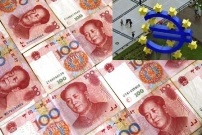By Steffen Dyck*
IDN-InDepth NewsViewpoint
While media reports are emphasising the role China could play in assisting to resolve the Eurozone debt crisis, a Deutsche Bank research analyst, Steffen Dyck, warns that expectations pinned on China might be far from realistic. The amount needed when looking at estimated refinancing needs for 2012 is huge, totalling EUR 730 billion for the GIIPS countries – an acronym for Greece, Ireland, Italy, Portugal and Spain.
FRANKFURT (IDN) – The Eurozone is China’s most important trading partner. The region takes up around 20 per cent of China’s total exports, which is slightly higher than the U.S. share in Chinese exports. From this angle, China has a vital interest in a stable Eurozone, as exports and export-related investment account for a substantial share of GDP (Gross Domestic Product) growth and – what is probably even more important – employment.
Estimates show that Chinese export growth could drop by 6-7 percentage points (pp) and real GDP growth by 1 pp in case GDP growth in the U.S. and EU slowed by 1 pp.
Furthermore, China has already invested in euro assets. According to various estimates, around 20-25 per cent of China’s total foreign currency reserves or EUR 480-600 billion are held in euro assets, presumably predominantly in highly rated sovereign instruments like German government bonds.
In addition, investors from China including Hong Kong bought 6 per cent of the EUR 5 billion initial issuance of the EFSF (European Financial Stability Facility) benchmark bond in January 2011. China has a stock of EUR 7 billion in foreign direct investments in the Eurozone, which comprises 3 per cent of its total outward FDI (Foreign Direct Investment) stock as of 2010. Last but not least, the euro is part of China’s envisaged tripolar world order – that is, co-existence of the U.S. Dollar (USD), euro (EUR), and Chinese Yuan as three leading global currencies.
The Eurozone as a whole needs around 17.5 per cent of estimated GDP for refinancing in 2012, equivalent to EUR 1.7 trillion euros. [Refinancing requirements are calculated as the estimated government budget deficit in 2012 plus outstanding T-bills plus government bond and loan.]
The largest share is of France with around 25 per cent of the total, followed by Italy with a share of almost 23 per cent. Spain, Greece, Portugal and Ireland together make up another 20 per cent or EUR 340 billion. Together, the five GIIPS countries will probably need EUR 730 billion in refinancing in 2012. For comparison, Germany needs EUR 325 billion or 19 per cent of estimated GDP in 2012.
China Not Awash With Cash
Many news reports paint a picture of China as being awash with cash due to its large foreign exchange reserves. However, these reserves are for the most part invested in long-term sovereign debt instruments, with around 60-65 per cent in USD instruments, 20-25 per cent in euro assets and the remainder split between other currencies. Presumably only a very small fraction is held in highly liquid short-term paper.
Theoretically, even longer-dated instruments could be liquidated; but given the large amounts necessary in the case of the GIIPS countries, this would send ripple effects through the UST market – except that Beijing decided to sell German government bonds and other core-EMU (Economic and Monetary Union) government bonds instead. Therefore, a more realistic scenario would be a slight acceleration of FX (foreign exchange) reserve diversification by investing an increasing share of additional or new reserves in euro assets.
Let us assume that total reserve accumulation in 2012 amounts to USD 650 billion (EUR 500 billion), which is the Deutsche Bank forecast. Even if the euro share were to rise to 30-35 per cent this would only mean USD 195-228 billion (EUR 150-175 billion) in financing available from China – or 20-24 per cent of the GIIPS countries’ total refinancing requirements.
The analysis above shows that even if China were willing to buy more troubled Eurozone countries’ sovereign debt this would not be sufficient to solve the GIIPS debt crisis. Moreover, we doubt that China is willing to take on substantial additional risks. Even China Investment Corporation (CIC), China’s sovereign wealth fund with a global portfolio of USD 135 billion, would be hesitant to load on GIIPS bonds as its “underlying investment objective is to seek long-term, sustainable, and high financial returns […] within acceptable risk tolerance.”
On top of that, Chinese public opinion towards increased investment is unlikely to be supportive as the general perception is that the troubled Eurozone member countries have lived beyond their means and are now turning to the savings of a country that is still confronted with domestic development needs of its own.
*Steffen Dyck is a Deutsche Bank Analyst. A version of this article appeared on September 16, 2011 on http://www.dbresearch.com under the headline, ‘China – Not really a white knight for the Eurozone’. [IDN-InDepthNews – September 21, 2011]
2011 IDN-InDepthNews | Analysis That Matters
Follow us on Twitter and Facebook:
http://twitter.com/InDepthNews
http://www.facebook.com/pages/IDN-InDepthNews/207395499271390?sk=wall

